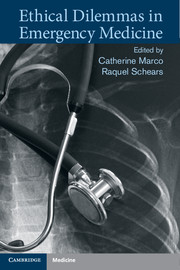Book contents
- Ethical Dilemmas in Emergency Medicine
- Ethical Dilemmas in Emergency Medicine
- Copyright page
- Contents
- Contributors
- Preface
- Book part
- 1 Principles of Medical Ethics
- 2 Law and Ethics
- 3 Triage in Emergency Medicine
- 4 Privacy, Confidentiality, and Public Health Reporting
- 5 Social Media and Electronic Communications
- 6 Multiculturalism and “Cultural Competency”
- 7 Informed Consent
- 8 Against Medical Advice, Refusal of Care, and Informed Consent
- 9 Care of Minors
- 10 The Difficult Patient
- 11 Law Enforcement in the Emergency Department
- 12 Research Ethics
- 13 Conflicts of Interest
- 14 Medical Errors and Patient Safety
- 15 Expert Witness Testimony
- 16 Values and Responsibilities in Professional Practice
- 17 The Ethics of Disasters
- 18 Stewardship of Health Care Resources
- 19 Education in Emergency Medicine
- 20 Suicide Attempts
- 21 Geriatric Emergency Medicine
- 22 Palliative Medicine
- 23 End-of-Life Care
- Book part
- Book part
- Index
- References
12 - Research Ethics
Published online by Cambridge University Press: 05 November 2015
- Ethical Dilemmas in Emergency Medicine
- Ethical Dilemmas in Emergency Medicine
- Copyright page
- Contents
- Contributors
- Preface
- Book part
- 1 Principles of Medical Ethics
- 2 Law and Ethics
- 3 Triage in Emergency Medicine
- 4 Privacy, Confidentiality, and Public Health Reporting
- 5 Social Media and Electronic Communications
- 6 Multiculturalism and “Cultural Competency”
- 7 Informed Consent
- 8 Against Medical Advice, Refusal of Care, and Informed Consent
- 9 Care of Minors
- 10 The Difficult Patient
- 11 Law Enforcement in the Emergency Department
- 12 Research Ethics
- 13 Conflicts of Interest
- 14 Medical Errors and Patient Safety
- 15 Expert Witness Testimony
- 16 Values and Responsibilities in Professional Practice
- 17 The Ethics of Disasters
- 18 Stewardship of Health Care Resources
- 19 Education in Emergency Medicine
- 20 Suicide Attempts
- 21 Geriatric Emergency Medicine
- 22 Palliative Medicine
- 23 End-of-Life Care
- Book part
- Book part
- Index
- References
- Type
- Chapter
- Information
- Ethical Dilemmas in Emergency Medicine , pp. 162 - 178Publisher: Cambridge University PressPrint publication year: 2015
References
For Further Reading
- 1
- Cited by



